现在进行时-过去进行时-现在完成时练习题
- 格式:docx
- 大小:22.74 KB
- 文档页数:4
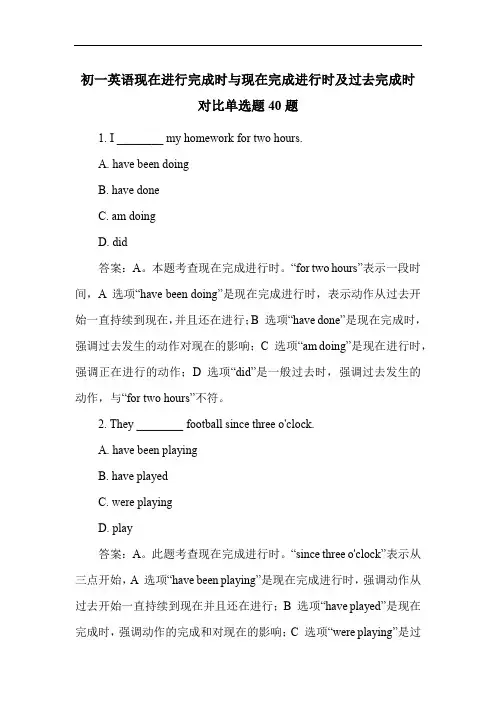
初一英语现在进行完成时与现在完成进行时及过去完成时对比单选题40题1. I ________ my homework for two hours.A. have been doingB. have doneC. am doingD. did答案:A。
本题考查现在完成进行时。
“for two hours”表示一段时间,A 选项“have been doing”是现在完成进行时,表示动作从过去开始一直持续到现在,并且还在进行;B 选项“have done”是现在完成时,强调过去发生的动作对现在的影响;C 选项“am doing”是现在进行时,强调正在进行的动作;D 选项“did”是一般过去时,强调过去发生的动作,与“for two hours”不符。
2. They ________ football since three o'clock.A. have been playingB. have playedC. were playingD. play答案:A。
此题考查现在完成进行时。
“since three o'clock”表示从三点开始,A 选项“have been playing”是现在完成进行时,强调动作从过去开始一直持续到现在并且还在进行;B 选项“have played”是现在完成时,强调动作的完成和对现在的影响;C 选项“were playing”是过去进行时,强调过去某个时间正在进行的动作;D 选项“play”是一般现在时,不符合时间状语。
3. She ________ the room all morning.A. has been cleaningB. has cleanedC. cleanedD. was cleaning答案:A。
本题考查现在完成进行时。
“all morning”表示整个上午,A 选项“has been cleaning”是现在完成进行时,强调动作从过去开始一直持续到现在并且还在进行;B 选项“has cleaned”是现在完成时,强调动作的完成;C 选项“cleaned”是一般过去时,强调过去发生的动作;D 选项“was cleaning”是过去进行时,强调过去某个时刻正在进行的动作。
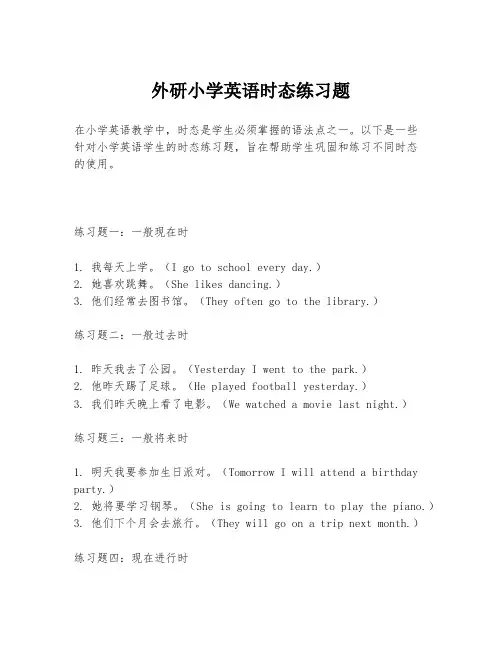
外研小学英语时态练习题在小学英语教学中,时态是学生必须掌握的语法点之一。
以下是一些针对小学英语学生的时态练习题,旨在帮助学生巩固和练习不同时态的使用。
练习题一:一般现在时1. 我每天上学。
(I go to school every day.)2. 她喜欢跳舞。
(She likes dancing.)3. 他们经常去图书馆。
(They often go to the library.)练习题二:一般过去时1. 昨天我去了公园。
(Yesterday I went to the park.)2. 他昨天踢了足球。
(He played football yesterday.)3. 我们昨天晚上看了电影。
(We watched a movie last night.)练习题三:一般将来时1. 明天我要参加生日派对。
(Tomorrow I will attend a birthday party.)2. 她将要学习钢琴。
(She is going to learn to play the piano.)3. 他们下个月会去旅行。
(They will go on a trip next month.)练习题四:现在进行时1. 他正在读一本书。
(He is reading a book.)2. 我们正在看电视。
(We are watching TV.)3. 现在外面正在下雨。
(It is raining outside now.)练习题五:过去进行时1. 昨天下午三点钟,我正在做作业。
(At three o'clock yesterday afternoon, I was doing my homework.)2. 昨晚七点,他们正在吃晚饭。
(At seven o'clock last night, they were having dinner.)3. 他昨晚正在画画。
(He was drawing a picture last night.)练习题六:现在完成时1. 我已经完成我的作业。

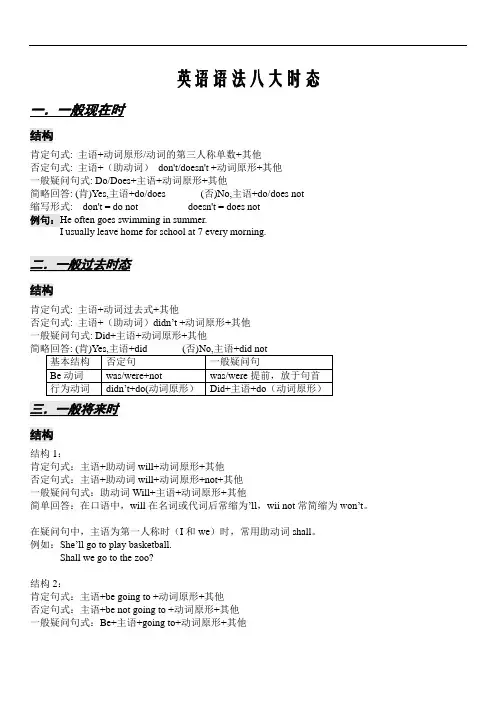
英语语法八大时态一.一般现在时结构肯定句式: 主语+动词原形/动词的第三人称单数+其他否定句式: 主语+(助动词)don't/doesn't +动词原形+其他一般疑问句式: Do/Does+主语+动词原形+其他简略回答: (肯)Yes,主语+do/does (否)No,主语+do/does not缩写形式: don't = do not doesn't = does not例句:He often goes swimming in summer.I usually leave home for school at 7 every morning.二.一般过去时态结构肯定句式: 主语+动词过去式+其他否定句式: 主语+(助动词)didn’t +动词原形+其他一般疑问句式: Did+主语+动词原形+其他基本结构否定句一般疑问句Be动词was/were+not was/were提前,放于句首行为动词didn’t+do(动词原形)Did+主语+do(动词原形)三.一般将来时结构结构1:肯定句式:主语+助动词will+动词原形+其他否定句式:主语+助动词will+动词原形+not+其他一般疑问句式:助动词Will+主语+动词原形+其他简单回答:在口语中,will在名词或代词后常缩为’ll,wii not常简缩为won’t。
在疑问句中,主语为第一人称时(I和we)时,常用助动词shall。
例如:She’ll go to play basketball.Shall we go to the zoo?结构2:肯定句式:主语+be going to +动词原形+其他否定句式:主语+be not going to +动词原形+其他一般疑问句式:Be+主语+going to+动词原形+其他简略回答:(肯)Yes,主语+be (否)No,主语+be not将来时其他表示法1)be going to表示将来表示说话人的打算、计划、安排或根据迹象判断必然或很可能发生的事情。
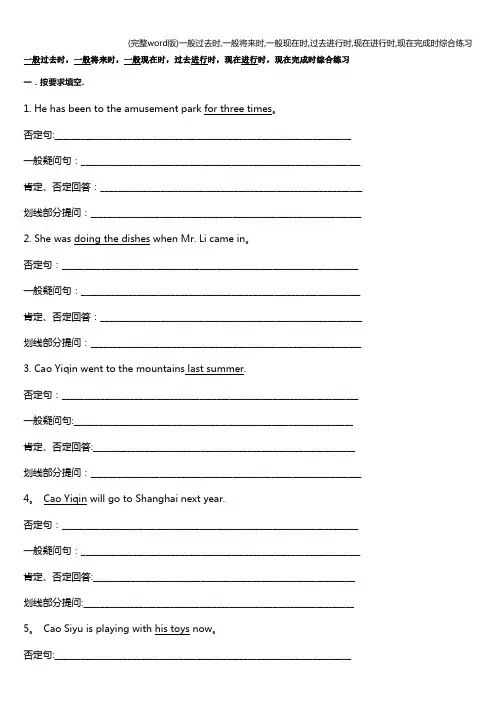
一般过去时,一般将来时,一般现在时,过去进行时,现在进行时,现在完成时综合练习一.按要求填空.1. He has been to the amusement park for three times。
否定句:_____________________________________________________________________一般疑问句:_________________________________________________________________肯定、否定回答:_____________________________________________________________划线部分提问:_______________________________________________________________ 2. She was doing the dishes when Mr. Li came in。
否定句:_____________________________________________________________________一般疑问句:_________________________________________________________________肯定、否定回答:_____________________________________________________________划线部分提问:_______________________________________________________________ 3. Cao Yiqin went to the mountains last summer.否定句:_____________________________________________________________________一般疑问句:_________________________________________________________________肯定、否定回答:_____________________________________________________________划线部分提问:_______________________________________________________________ 4。
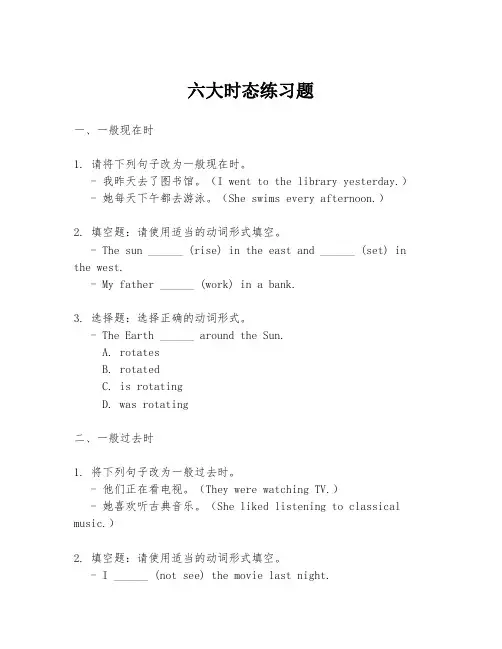
六大时态练习题一、一般现在时1. 请将下列句子改为一般现在时。
- 我昨天去了图书馆。
(I went to the library yesterday.) - 她每天下午都去游泳。
(She swims every afternoon.)2. 填空题:请使用适当的动词形式填空。
- The sun ______ (rise) in the east and ______ (set) in the west.- My father ______ (work) in a bank.3. 选择题:选择正确的动词形式。
- The Earth ______ around the Sun.A. rotatesB. rotatedC. is rotatingD. was rotating二、一般过去时1. 将下列句子改为一般过去时。
- 他们正在看电视。
(They were watching TV.)- 她喜欢听古典音乐。
(She liked listening to classical music.)2. 填空题:请使用适当的动词形式填空。
- I ______ (not see) the movie last night.- They ______ (visit) the museum yesterday.3. 选择题:选择正确的动词形式。
- She ______ the bookshelf last week.A. builtB. was buildingC. buildsD. has built三、一般将来时1. 将下列句子改为一般将来时。
- 我们明天去购物。
(We will go shopping tomorrow.) - 他将要成为一名医生。
(He is going to be a doctor.)2. 填空题:请使用适当的动词形式填空。
- I ______ (take) a vacation next month.- They ______ (move) to a new house next year.3. 选择题:选择正确的动词形式。
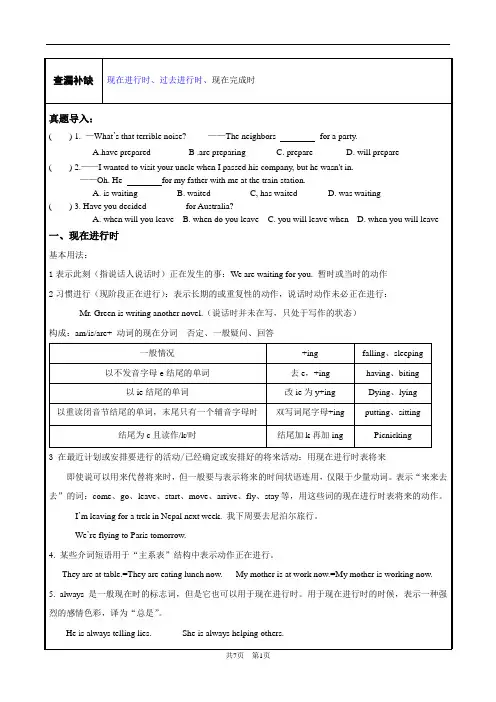
【当堂练习】1. Why didn’t Peter his homework? —He said he had lost his workbook. I think it’s a excuse.A. doesB. doingC. doD. did2. Pukou Railway Station in 1911 and it has become a filming location for films and TV plays in recent years.A. buildB. is builtC. builtD. was built3. Where is Joan? She a novel in her study. A. has read B. reads C. will read D. is reading4. Too many people were absent. The chairperson warned that he the meeting if necessary.A. would cancelB. cancelledC. would startD. started5. You will see many aunts dancing together on the square if it in the evening.A. doesn’t rainB. rainsC. will rainD. won’t rain6. Helen encouraged me to speak English as much as possible because practice perfect.A. becomesB. becameC. will makeD. makes7. Sherlock Homes asked the suspect what he when the murder took place.A. was doingB. has doneC. is doingD. would do8. Can Mr. King spare time for the charity show?If he , he will try his best to make it.A. will be invitedB. is invitedC. invitesD. invited9. Will you watch the program Running Man in Zhejiang Star-TV tonight?Yes, of course. It one of the most popular shows since last October.A. wasB. becameC. has beenD. has become10. Her son the army for two months. She misses him very much.A. has joinedB. has been inC. joinedD. was in11. Hi, Jack. Nice to meet you here in Taizhou! —Me too. But I you were in Shanghai.A. thinkB. thoughtC. am thinkingD. will think12. Hurry up! The movie for a quarter.A. has begunB. has been onC. has goneD. has finished13. You look worried. What’s wrong? —I went for a job interview yesterday and I the result.A. waited forB. was waiting forC. am waiting forD. will wait for14. Helen, when did you move here? —I here since two years ago.A. movedB. livedC. have movedD. have lived15. Have you ever been to Canada? —Yes, I there last year with my parents.A. have beenB. have goneC. wentD. go16. Betty will ring me up when she in Beijing.A. arriveB. arrivesC. arrivedD. will arrive17. I my hometown for a long time, I really miss it!A. leftB. went away fromC. have leftD. have been away from18. Do you know if ______ back next week? If he ______ back, please let me know.A. he comes, will comeB. will he come, comesC. he will come, comesD. will he come, will come19. —Do you know ___ for Shanghai last night? --- At 9:00.A.what time he leavesB. What time does he leaveC. What time he leftD. What time did he leave20. Jim doesn’t understand ____________.A. which is the way to the museumB. why his wife always goes shoppingC. what is the way to the museumD. why does she always go shopping21. ---Listen! It is still noisy in the head teacher’s office.A. thoughB. whetherC. unlessD. while22. Our teacher told us the sun ________ in the east.A. riseB. roseC. risingD. rises23. --When do you think _________?---About half past five. I will pick him up at the airport.A. he will comeB. will he comeC. did he comeD. he came24. — Did you see Dr Ma yesterday afternoon?—When I got to his office, he ______. So we just talked little.A. leftB. has leftC. was leavingD. had left25.— Hi, Jane, tell you a piece of good news. I America tomorrow. — Wow, have a good trip!A. will leave toB. going leaving forC. am leaving forD. leaves for。
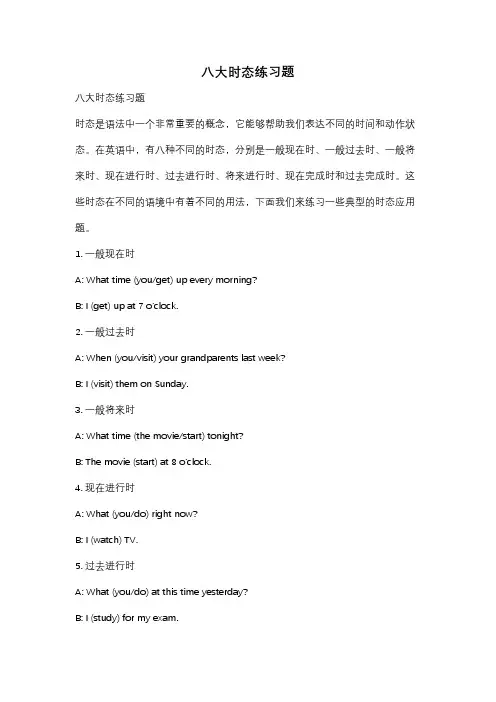
八大时态练习题八大时态练习题时态是语法中一个非常重要的概念,它能够帮助我们表达不同的时间和动作状态。
在英语中,有八种不同的时态,分别是一般现在时、一般过去时、一般将来时、现在进行时、过去进行时、将来进行时、现在完成时和过去完成时。
这些时态在不同的语境中有着不同的用法,下面我们来练习一些典型的时态应用题。
1. 一般现在时A: What time (you/get) up every morning?B: I (get) up at 7 o'clock.2. 一般过去时A: When (you/visit) your grandparents last week?B: I (visit) them on Sunday.3. 一般将来时A: What time (the movie/start) tonight?B: The movie (start) at 8 o'clock.4. 现在进行时A: What (you/do) right now?B: I (watch) TV.5. 过去进行时A: What (you/do) at this time yesterday?B: I (study) for my exam.6. 将来进行时A: What (you/do) this time tomorrow?B: I (work) on a project.7. 现在完成时A: How many books (you/read) so far this year?B: I (read) ten books.8. 过去完成时A: By the time I arrived, they (already/leave).B: Oh no, I (miss) them.这些练习题涵盖了八种不同的时态,让我们更好地理解和掌握它们的用法。
一般现在时用于描述经常性的动作或事实,一般过去时用于过去发生的动作或事情,一般将来时用于表示将来的动作或计划,现在进行时用于描述正在进行的动作,过去进行时用于过去某个时间正在进行的动作,将来进行时用于描述将来某个时间正在进行的动作,现在完成时用于描述过去发生的动作对现在造成的影响,过去完成时用于描述过去某个时间之前已经完成的动作。
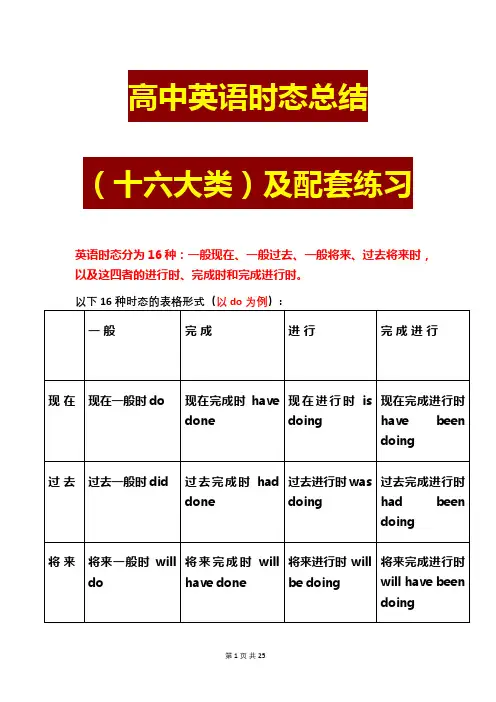
高中英语时态总结(十六大类)及配套练习英语时态分为16种:一般现在、一般过去、一般将来、过去将来时,以及这四者的进行时、完成时和完成进行时。
注:构成时态的助动词be (is, am, are), have (has, have), shall, will 等需根据主语的变化来选择。
1. 一般现在时A) 表示现在发生的动作、情况、状态和特征。
B) 习惯,兴趣,爱好等。
C) 经常性、习惯性动作。
He always helps others.D) 客观事实和普遍真理。
尤其要注意,如果前后文不是一般现在时,则无法保持主句、从句时态一致。
E) 表示一个按规定、计划或安排要发生的动作,(仅限于某些表示“来、去、动、停、开始、结束、继续”等的动词)可以与表示未来时间的状语搭配使用。
常见的用法是:飞机、火车、轮船、汽车等定期定点运行的交通方式。
The next train leaves at 3 o'clock this afternoon.How often does this shuttle bus run?F) 在时间和条件状语从句里经常用一般现在(有时也用现在完成时)表示将来事情。
When you have finished the report, I will have waited for about 3 hours.2. 现在进行时(be doing)用法:现在正在进行的动作。
3. 现在完成时(have done)A) 表示动作到现在为止已经完成或刚刚完成。
I bought a new house, but Imy old one yet, so at the moment I have two houses.A. didn't sellB. soldC. haven't soldD. would sellGreat as Newton was, many of his ideastoday and are being modified by the work of scientists of our time.A. are to challengeB. have been challengedC. may be challengedD. are challengingB.如何区分完成时态和过去时态①现在完成时是联系过去和现在的纽带。
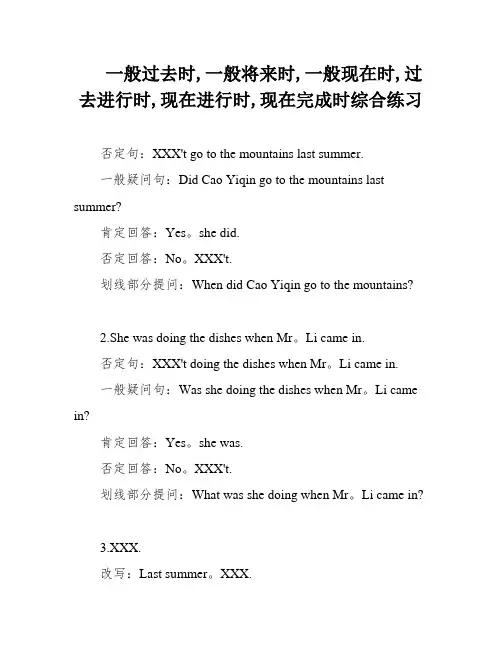
一般过去时,一般将来时,一般现在时,过去进行时,现在进行时,现在完成时综合练习否定句:XXX't go to the mountains last summer.一般疑问句:Did Cao Yiqin go to the mountains last summer?肯定回答:Yes。
she did.否定回答:No。
XXX't.划线部分提问:When did Cao Yiqin go to the mountains?2.She was doing the dishes when Mr。
Li came in.否定句:XXX't doing the dishes when Mr。
Li came in.一般疑问句:Was she doing the dishes when Mr。
Li came in?肯定回答:Yes。
she was.否定回答:No。
XXX't.划线部分提问:What was she doing when Mr。
Li came in?3.XXX.改写:Last summer。
XXX.1.My family and I went on a trip to Europe last summer。
We visited many countries。
such as France。
Italy。
XXX.否定句:My family and I did not go on a trip to Europe last summer.一般疑问句:Did your family and you go on a trip to Europe last summer?肯定回答:Yes。
we did.否定回答:No。
we did not.划线部分提问:What did you see during your trip to Europe?2.XXX。
I woke up early and went for a jog。
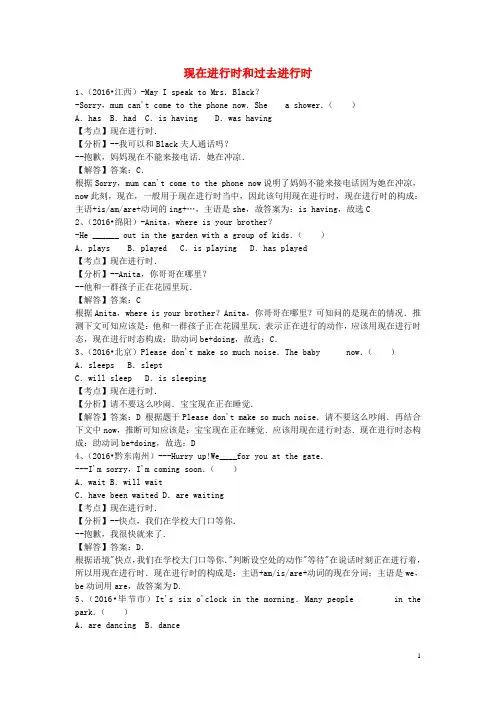
现在进行时和过去进行时1、(2016•江西)-May I speak to Mrs.Black?-Sorry,mum can't come to the phone now.She a shower.()A.has B.had C.is having D.was having【考点】现在进行时.【分析】--我可以和Black夫人通话吗?--抱歉,妈妈现在不能来接电话.她在冲凉.【解答】答案:C.根据Sorry,mum can't come to the phone now说明了妈妈不能来接电话因为她在冲凉,now此刻,现在,一般用于现在进行时当中,因此该句用现在进行时,现在进行时的构成:主语+is/am/are+动词的ing+…,主语是she,故答案为:is having,故选C2、(2016•绵阳)-Anita,where is your brother?-He ______ out in the garden with a group of kids.()A.plays B.played C.is playing D.has played【考点】现在进行时.【分析】--Anita,你哥哥在哪里?--他和一群孩子正在花园里玩.【解答】答案:C根据Anita,where is your brother?Anita,你哥哥在哪里?可知问的是现在的情况.推测下文可知应该是:他和一群孩子正在花园里玩.表示正在进行的动作,应该用现在进行时态,现在进行时态构成:助动词be+doing,故选:C.3、(2016•北京)Please don't make so much noise.The baby now.()A.sleeps B.sleptC.will sleep D.is sleeping【考点】现在进行时.【分析】请不要这么吵闹.宝宝现在正在睡觉.【解答】答案:D 根据题干Please don't make so much noise.请不要这么吵闹.再结合下文中now,推断可知应该是:宝宝现在正在睡觉.应该用现在进行时态.现在进行时态构成:助动词be+doing,故选:D4、(2016•黔东南州)---Hurry up!We____for you at the gate.---I'm sorry,I'm coming soon.()A.wait B.will waitC.have been waited D.are waiting【考点】现在进行时.【分析】--快点,我们在学校大门口等你.--抱歉,我很快就来了.【解答】答案:D.根据语境"快点,我们在学校大门口等你."判断设空处的动作"等待"在说话时刻正在进行着,所以用现在进行时.现在进行时的构成是:主语+am/is/are+动词的现在分词;主语是we,be动词用are,故答案为D.5、(2016•毕节市)It's six o'clock in the morning.Many people in the park.()A.are dancing B.danceC.is dancing D.dances【考点】现在进行时.【分析】现在是早晨六点,很多人在公园里跳舞.【解答】答案:A.根据时间状语 It's six o'clock in the morning结合语境"现在是早晨六点,很多人在公园里跳舞."判断设空处的动作在说话时刻正在进行着,所以用现在进行时.现在进行时的构成是:主语+am/is/are+动词的现在分词;主语是复数名词,be动词用are,故答案为A.6、(2016•成都)--Lily,where is your father now?Go and get him for lunch.--Just a moment,please.Father______a phone call in his room.()A.makes B.is making C.was making【考点】现在进行时.【分析】--莉莉,你爸爸现在在哪里?去叫他吃午饭.--请稍等片刻,爸爸在他房间里正在接电话.【解答】答案B.由语境请稍等片刻,可知父亲一定在忙,从后面句子可知,当时正在接电话,所以要用现在进行时态,现在进行时基本结构:is/are/am+ving,故选B7、(2016•永州)-What are you doing now?-I ___to the music.()A.is listening B.am listeningC.Was listening【考点】现在进行时.【分析】--你现在在做什么?--我正在听音乐.【解答】答案B.由语意:--你现在在做什么?--我现在正在听音乐.与时间副词now,可知应用现在进行时态,又因为主语是I,所以用am listening,故选B8、(2016•河南)Everyone wants to reach the top of the mountain,but all the happiness happens while you it.()A.climb B.climbedC.are climbing D.have climbed【考点】现在进行时.【分析】人人都想到达山顶,但是登山的快乐就在你爬山的过程中.【解答】答案:C.在这里while是当…的时候,它引导一个时间状语从句,而且主句的动作发生在从句动作进行的过程中,所以while引导的句子用进行时,本题根据句意"人人都想到达山顶,但是登山的快乐就在你爬山的过程中."判断用现在进行时,构成是:主语+am/is/are+动词的现在分词.故选C9、(2016•福州)-Pass the raincoat to me,please.It _______ hard now.-Here you are.()A.is raining B.rained C.will rain【考点】现在进行时.【分析】---请把雨衣递给我.现在下得很大.---给你.【解答】答案:A 联系汉语意思,根据now可知,这是现在进行时的标志词,其结构为am/is/are+doing.又知it是第三人称单数,所以此处应用is raining.故选A.10、(2016•南京)-Hi,Nora.Is your mother at home?-Just a minute!She______flowers in the garden.()A.plant B.is plantingC.planted D.was planting【考点】现在进行时.【分析】你好,Nora,你妈妈在家吗?--等一会!她正在花园种花.【解答】答案:B 根据Just a minute,可知Nora让前来找他妈妈的人等一会,妈妈正在忙着做某事.故应用现在进行时(be+doing).she为第三人称单数,be用is.A选项为一般现在时;B为现在进行时;C为一般过去时;D为过去进行时.故选B11、(2016•昆明)Look!A dog ____a blind man across the road()A.leads B.lead C.is leading D.led【考点】现在进行时.【分析】看!一只狗正在引导一个盲人过马路.【解答】答案:C 根据时态标志词"look!",可知这是现在进行时的标志词.现在进行时的构成为is/am/are+doing.主语"a dog"为第三人称单数,故应该用is.故选C12、(2016•孝感)Alice,please turn down the music,I ________ an important phone now.()A.answer B.answeredC.have answered D.am answering【考点】现在进行时.【分析】爱丽丝,请把音乐关了,我现在正在接一个重要电话.【解答】答案D.由结合语境及时间副词now,可知应用现在进行时态am answering,句意是我现在正在接一个重要电话.故选D.13、(2016•咸宁)--Today's young people can't live without smart phones.--They keep their hands on the phones whether they go,even while they______meals.()A.have B.are havingC.were having D.will have【考点】现在进行时.【分析】-如今的年青人没有智能机不能生存了.-他们无论到哪都拿着手机,甚至在吃饭的时候都在玩手机.【解答】答案:B;While引导状语从句时,强调主从动作的同时发生,从句中常用进行时态.根据句中信息They keep their hands on the phones whether they go可知从句中强调的是动作现在正在进行的状态,用现在进行时态表达:主语+be动词(am/is/are)+动词ing形式〔现在分词〕;故选B14、(2016•南充)Be quiet!The baby_____.()A.sleeps B.sleptC.are sleeping D.is sleeping【考点】现在进行时.【分析】安静!婴儿正在睡觉.【解答】答案:D.通过 be quiet."请安静",可知,小孩应该正在睡觉,所以应该用现在进行时.现在进行时的结构是be+doing.而the baby是单数.故谓语也应用单数is,所以本题选D.15、(2016•荆门)---You are in a hurry.Where are you going?---To the cinema.Jim___for me there!()A.waits B.is waitingC.waited D.was waiting【考点】现在进行时.【分析】--你这么匆忙.你将要去哪里?--去电影院.Jim正在那儿等我.【解答】答案:B;根据句中信息You are in a hurry.Where are you going?(你这么匆忙.你将要去哪里?)及To the cinema.Jim___for me there推测该句句意:此时此刻Jim正在那儿等我;可知该句用现在进行时态:am/is/are+现在分词;故选B.16、(2016•云南)-Can John play soccer with us,Mrs.Black?-One moment,please.He on the phone to his cousin.()A.talks B.talked C.talking D.is talking【考点】现在进行时.【分析】-布莱克太太,约翰能和我们踢足球吗?-请稍等,他正在给他的表弟打电话.【解答】答案:D;根据上句Can John play soccer with us,Mrs.Black,结合答语-One moment,please推测下句句意:他正在给他的表弟打电话;可知该句用现在进行时态:am/is/are+现在分词;因为主语是He;故选D.17、(2016•恩施州)-There are some boys ______ basketball over there.-Let's go and join them.()A.are playing B.playingC.to play【考点】现在进行时.【分析】-那儿有些男孩正在打篮球.-让我们去加入他们吧.【解答】答案:B;play 玩,打球,原形;to play 动词不定式;playing 动名词或现在分词形式;are playing现在进行时.根据答语Let's go and join them推测上句句意:有一些男孩正在打篮球,故用playing表示动作正在进行.There are some boys playing basketball over there.=Some boys are playing basketball over there;故用playing;故选B18、(2016•黄冈)-Where are you going,Bob?-To go hiking.Eric ________ for me at the school gate!()A.was waiting B.waitsC.waited D.is waiting【考点】现在进行时.【分析】-你要去哪里,鲍勃?-去远足,Eric 正在学校门口等我.【解答】答案:D;根据上句Where are you going,Bob?和答语To go hiking.推测下句句意:Eric 正在学校门口等我.故用现在进行时态:am/are is+现在分词;故选D19、(2016•漳州)-How did the accident happen?-The girl Wechat(微信)while walking across the street.()A.reads B.is readingC.was reading【考点】过去进行时.【分析】-事故是如何发生的?-女孩过马路的时候,正在看微信.【解答】答案:C;while 引导的从句在事情同时发生的情况时,主句和从句都用进行时;根据句中信息The girl…Wechat(微信)while walking across the street.可知主句和从句表示的动作是同时发生的,根据上句How did the accident happen?可知该句描述的是过去发生的动作,故主句要用过去进行时态表达;其形式为was/were+现在分词.故选C.20、(2016•兰州)My sister with my parents dumplings when I got home yesterday evening.()A.are making B.is makingC.was making D.were making【考点】过去进行时.【分析】昨天晚上当我到家的时候,我妹妹在和我父母正一起包水饺.【解答】答案:C.根据when引导的时间状语从句用了一般过去时,判断设空处的动作在过去某个时刻,即"当我到家时"正在进行着,且动作在一段时间内持续进行,所以用过去进行时,过去进行时的构成是:主语+was/were+动词的现在分词,另外主语后面跟with短语时,谓语动词由with 前面的主语来确定,My sister是第三人称单数形式,故选C.21、(2016•哈尔滨)-Could you tell me where you found Miss Gao just now?-Gertainly.In the principal's office.They happily at that time.()A.are talking B.have talkedC.were talking【考点】过去进行时.【分析】-你能告诉我刚才你在哪里找到的高小姐吗?-当然可以,在校长的办公室.在那个时间他们正愉快地交谈.【解答】答案:C.根据语境just now(刚才)和at that time(在那时)可这动作是过去正在进行的,故应用过去进行时态(基本结构:was/were+动词的现在分词),故答案为C.22、(2016•济南)Sun Hai his mother make dinner when his father got home from work.()A.was helping B.helpsC.helped D.is helping【考点】过去进行时.【分析】当孙海的爸爸下班回家的时候,他正在帮助妈妈做晚饭.【解答】答案:A根据 when引导的一般过去时的时间状语从句推断主句描述的是过去某个时间正在发生的动作,故用过去进行时态,它的构成为:主语+was/were+V-ing形式,主语是第三人称单数形式,be动词应该用was.故选A23、(2016•十堰)-I shouted to you at the gate,bue you didn't hear me.-Really?I____a telephone call to my mother.()A.make B.was making C.made D.have made【考点】过去进行时.【分析】-我在门口大声喊你,但是你没有听到我.-真的吗?我正在给我妈妈打电话.【解答】答案:B;根据上句I shouted to you at the gate,bue you didn't hear me 和答语Really?推测答语应为:我正在给我妈妈打电话.因为句中描述的是过去正在发生的动作,故用过去进行时态表达;"主语+was/were+现在分词";因为主语是I,故填wasmaking;故选B.24、(2016•恩施州)--Where is your father?-I don't know,but he _______ the car when I left just now.()A.is washing B.washedC.was washing【考点】过去进行时.【分析】--你爸爸在哪里?--我不知道.但是刚才当我离开的时候他在洗车.【解答】答案:C.根据设空处when引导的时间状语从句用了一般过去时,判断设空处的动作在过去某个时刻,即"当我离开时"正在进行着,且动作在一段时间内持续进行,所以用过去进行时,过去进行时的构成是:主语+was/were+动词的现在分词,主语是he,所以be动词用was,故选C 25、(2016•安顺)---I called you at 5:00 yesterday afternoon,but no one answered.---Sorry,I ______ football with my friends at that time.()A.play B.playedC.will play D.was playing【考点】过去进行时.【分析】--昨天下午五点我给你打电话,但是没有人接.--抱歉,那个时候我在跟我的朋友们一起踢足球.【解答】答案:D.首先根据时间状语 at that time,判断设空处的动作在过去某个时刻,即"昨天下午五点"正在进行着,且动作在一段时间内持续进行,所以用过去进行时,过去进行时的构成是:主语+was/were+动词的现在分词,主语是I所以be动词用was;故选D.26、(2016•天津)My mother dinner when I got home yesterday.()A.has cooked B.was cookingC.will cook D.cooks【考点】过去进行时.【分析】昨天当我到家的时候我的妈妈在做晚餐.【解答】答案:B根据 when引导的一般过去时的时间状语从句推断主句描述的是过去某个时间正在发生的动作,故用过去进行时态,它的构成为:主语+was/were+V-ing形式,主语是第三人称单数形式,be动词应该用was.故选B27、(2016•苏州)-Oh,dear!A power cut!-Sorry,I didn't know you the washing machine.()A.are using B.used C.use D.were using【考点】过去进行时.【分析】噢,亲爱的,停电了!抱歉,我不知道你正在用洗衣机.【解答】答案:D.下文的I didn't know 是主句,是一般过去时,后面跟上宾语从句,从句也要用相应的过去时态,结合句意是停电的时候他正在用洗衣机,故用过去进行时was/were+doing,主语you,故were,使用use的现在分词using,故答案是D28、(2016•大庆)--Where were you when I called?--I on the bed()A.lied B.was lying C.lay D.was lieing【考点】过去进行时.【分析】--当我给你打电话时你在哪里?--我正躺在床上.【解答】答案:B.根据问句中when引导的时间状语从句用了一般过去时,判断答语中设空处的动作在过去某个时刻,即"我给你打电话时"正在进行着,且动作在一段时间内持续进行,所以用过去进行时,过去进行时的构成是:主语+was/were+动词的现在分词,主语是I,所以be动词用was,lie译为"躺着"时,现在分词形式是lying,故选B29、(2016•黑龙江)He ______ newspapers when the earthquake happened in Japan.()A.was looking through B.looked throughC.had looked through【考点】过去进行时.【分析】当日本发生地震时,他正在看报纸.【解答】答案A.由句子:when the earthquake happened in Japan.可知是描述的是过去,再结合句意:当日本发生地震时,他正在看报纸.可知是发生地震时,他正在干什么,用过去进行时态.故选A30、(2016•安徽)I saw Sam and David in the playground yesterday afternoon.They____games with their classmates then.()A.play B.will playC.are playing D.were playing【考点】过去进行时.【分析】昨天下午我看到Sam和David在操场上,那时他们正在和同学们一起玩游戏.【解答】答案:D.根据时间状语then结合语境"昨天下午我看到Sam和David在操场上,那时他们正在和同学们一起玩游戏."判断设空处的动作在过去某个时刻正在进行着,且动作在一段时间内持续进行,所以用过去进行时,过去进行时的构成是:主语+was/were+动词的现在分词,主语是they,所以be动词用were,故选D.31、(2016•威海)---I called you yesterday evening.But nobody answered.---Oh,sorry.Maybe I____in the bathroom at that time.()A.take a shower B.took a showerC.was taking a shower【考点】过去进行时.【分析】昨晚我给你打电话.但是没有人接.对不起.可能当时我正在浴室里洗澡.【解答】答案:C 根据"I called you yesterday evening.But nobody answered"可知此人是表达昨晚给你电话的时候,你怎么没接.故答句中要表达昨晚打电话那个时间点正在做的事情.根据时间状语at that time,这是过去进行时的时间标志词.故此句应用过去进行时(was/were+doing).主语I,谓语动词应用was.故选C.。
英语动词时态语态练习题英语动词时态和语态是英语学习中的重要部分,掌握它们对于提高语言运用能力至关重要。
以下是一些练习题,旨在帮助学生加深对英语动词时态和语态的理解。
练习题一:填空题1. She has been to Paris twice. (现在完成时)2. They were having dinner when I called them last night. (过去进行时)3. If it rains tomorrow, we will cancel the picnic. (一般现在时,条件句)4. The letter was sent by express mail. (被动语态,一般过去时)5. He will be studying abroad next year. (将来进行时)6. The children are playing in the garden. (现在进行时)7. The concert was over by the time we arrived. (过去完成时)8. She has just finished her homework. (现在完成时)9. The house was built in 1920. (被动语态,一般过去时)10. I am looking forward to seeing you. (现在进行时)练习题二:改错题1. She is going to have a meeting tomorrow. (改为一般现在时)- She has a meeting tomorrow.2. The book was read by him last week. (改为主动语态)- He read the book last week.3. They are working on the project since last month. (改为完成进行时)- They have been working on the project since last month.4. The flowers will be watered by me tomorrow. (改为主动语态) - I will water the flowers tomorrow.5. She was seen to enter the building by the security guard. (改为主动语态)- The security guard saw her enter the building.练习题三:填空题(使用正确的时态和语态)1. I am (be) very happy to hear from you.2. The project was (complete) successfully last month.3. They have been (live) in this city for five years.4. She is (write) a book about her travels.5. The problem will be (solve) by the team soon.6. The house was (build) in the 18th century.7. The children are (play) in the park right now.8. The report has (be) submitted to the manager.9. He will be (study) for his exams next week.10. The cake was (bake) by my mother yesterday.练习题四:翻译题1. 我昨天去了图书馆。
时态练习题和答案1. 我昨天去了图书馆。
(一般过去时)- I went to the library yesterday.2. 他正在看书。
(现在进行时)- He is reading a book.3. 我们下周将去海滩。
(一般将来时)- We will go to the beach next week.4. 她经常在周末去购物。
(一般现在时)- She often goes shopping on weekends.5. 我还没有完成作业。
(现在完成时)- I have not finished my homework yet.6. 他们已经离开这个城市了。
(现在完成时)- They have already left the city.7. 我本应该早点起床的。
(过去完成时)- I should have woken up earlier.8. 他将会在明天回来。
(将来完成时)- He will have returned by tomorrow.9. 我正在学习英语。
(现在进行时)- I am learning English.10. 我去年这个时候正在度假。
(过去进行时)- I was on vacation this time last year. 答案1. went2. is reading3. will go4. often goes5. have not finished6. have already left7. should have woken up8. will have returned9. am learning10. was on vacation练习题11. 他们下周将参加一个会议。
(一般将来时)- They will attend a meeting next week.12. 我小时候经常去钓鱼。
(一般过去时)- I used to go fishing as a child.13. 我们明天会讨论这个问题。
一、现在进行时()1.我在照看孩子.(A)I am looking after the baby. (B)I'm look aftering the baby.(C)I look am aftering the baby. (D)I looking after the baby.( )3.Is the woman ______ yellow your teacher?(A)in (B)putting on (C)wearing (D)having ( )4.Look!The twins_____their mother do the housework.(A)are wanting (B)help (C)are helping (D)are looking ( )5._____are the birds doing? They are singing in a tree.(A)Who (B)What (C)How (D)Where( )6.Is she____something? (A)eat (B)eating (C)eatting (D)eats ( )7.你在干什么?(A)What is you doing? (B)What are you do?(C)What are you doing? (D)What do you do?( )8.What are you listening_____? (A)/ (B)for (C)at (D)to ( )9.我正在听他说话.(A)I listening to him. (B)I'm listening to him .(B) (C)I'm listen to him. (D)I'm listening him.( )10.They are_____their clothes.(A)making (B)putting (C)put away (D)putting on ( )11.Listen! She____in the classroom.(A)is singing (B)sing (C)to sing (D)is sing( )12.Today Jim______ his white shirt and brown trousers.(A)is putting on (B)wear (C)put on (D)is wearing ( )13.______are you eating?I'm eating______meat.(A)What,some (B)Which,any (C)Where,not (D)What,a ( )14.They______TV in the evening.They do their homework.(A)are watching (B)can't watch (C)don't watch (D)don't watching ( )15.The children_____football.(A)is playing (B)are playing (C)play the (D)play a( )16.They are flying kites.(A)他们喜欢放风筝. (B)他们在放风筝吗?(C)他们在放风筝. (D)他们常放风筝.( )17.Look,They are swimming in the river. I want_____you.(A)to go with (B)go with (C)helping (D)help( )18.Look.Lucy is_____a new bike today.(A)jumping (B)running (C)riding (D)takeing19. Listen! They ___ _____ in the next room.A. singB. is singingC. are singingD. were singing20. Lucy is always busy. She _____ only five hours every day.A. is sleepingB. will sleepC. would sleepD. sleeps21. It’s eight o’clock. The students ______ an English class.A. haveB. havingC. is havingD. are having22. ---Is your father a doctor?---Yes, he is. He _______ in Town Hospital.A. has workedB. is workingC. worksD. worked23. Physics ______ much harder than English, I think.A. areB. isC. wasD. were24. ---Mary, could you help me?---Wait a moment. I _____.A.read a bookB. did my homeworkC. was watching TVD. am cooking dinner.25. The final exam _____ next Thursday.A. will take placeB. take placeC. is taking placeD. takes place26. ---Can your father drive?---Yes, and he usually ______ to school.A. droveB. is drivingC. drivesD. has driven27. ---Excuse me, where is Jim?---Oh, he ______ dumplings in the kitchen.A. makesB. will makeC. is makingD. made28. ---Hurry up! It’s time to leave.---Ok, ______.A. I comeB. I’ve comeC. I’ll comeD. I’m coming29. Don’t turn on the TV. Grandma _______ now.A. is sleepingB. will sleepC. sleptD. sleeps30. ---______ you ______ a book? ---Yes, I am.A. Do; readB. Are; readC. Are; readingD. Are; looking31. Sometimes she _______ in the day, but now she is ________.A. works; workingB. working; workC. work; workingD. work; work32. Kate _________, and the others _________.A. sing; listenB. is singing; is listeningC. sing; are listeningD. is singing; are listening33. ---Tom _____ the piano in the room.---Please ask him to come here.A. playB. playsC. playedD. is playing过去进行时1.I ______ a meal when you _____ me.a. cooked, were ringingb. was cooking, rangc. was cooking, were ringingd. cooked, rang2. He said he _____ to draw a plane on the blackboard at that time.a. triesb. triedc. was tryingd. will try3. While she ______ TV, she ______ a sound outside the room.a. was watching, was hearingb. watched, was hearingc. watched, heardd. was watching, heard4. They _____ a football game from 7 to 9 last night.a. were watchingb. watchc. watchedd. are watching5. What book ____ you ______ when I ____ you at four yesterday afternoon?a. did, read, was seeingb. did, read, sawc. were, reading, sawd. were, reading, was seeing6. It was Friday evening. Mr and Mrs. Green _____ ready to fly to England.a. are gettingb. getc. were gettingd. got7. Lei Feng _____ always _____ of others when he ______ in the army.a. is, thinking, wasb. was, thinking, isc. did, think, isd. was, thinking, was8. A girl ______ my pen fall off the table when she _____ me.a. saw, passedb. was seeing, passedc. was seeing, passedd. was seeing, was passing9.We ____ for tom at ten last Sunday. He often kept us ______.a. were waiting, waitingb. were waiting, waitc. waited, waitingd. waited, wait10. He ____ his father on the farm the whole afternoon last Saturday.a. helpsb. would helpc. was helpingd. is helping11. While mother _______ some washing, I _____ a kite for Kate.a. did, madeb. was doing, madec. was doing, was makingd. did, was making12. “_______ you angry then?” “they ______ too much noise.”a. are, were makingb. were, were makingc. are, maded. were, made13. He ____ some cooking at that time, so _____ mea. did, heardb. did, didn’t hearc. was doing, heardd. was doing, didn’t hear14. This time yesterday jack _____ his bike. He _____ TVa. repaired, didn’t watchb. was repairing, watchedc. repaired, watchedd. was repairing, wasn’t watching15. His parents wanted to know how he _____ on with his new classmates.a. was gettingb. getsc. is gettingd. will get16.My brother ___ while he ___ his bicycle and hurt himself.A. fell, was ridingB. fell, were ridingC. had fallen, rodeD. had fallen, was riding17. Tom ___ into the house when no one ___.A. slipped, was lookingB. had slipped, lookedC. slipped, had lookedD. was slipping, looked18.The last time I __ Jane she ___ cotton in the fields.A. had seen, was pickingB. saw, pickedC. had seen, pickedD. saw, was picking19.I don ' t think Jim saw me; he ___ into space.A. just staredB. was just staringC. has just staredD. had just stared20.I first met Lisa three years ago. She ___ at a radio shop at the time.A. has workedB. was workingC. had been workingD. had worked21.---Hey, look where you are going!---Oh, I ' m terribly sorry.________.A. I ' m not noticingB. I wasn ' t noticingC. I haven ' t noticedD. I don ' t notice22. The reporter said that the UFO ___ east to west when he saw it.A. was travelingB. traveledC. had been travelingD. was to travel23 I ___ my breakfast when the morning post came.A. hadB. had been havingC. have been havingD. was having24.When I arrived at his office, he ___ on the phone.A. was speakingB. spokeC. had been speakingD. had spoken25. “ What ' s the matter, Ali? You look sad. ”“ Oh, nothing much. As a matter of fact, I ___ of my friends back home. ”A. just thoughtB. have just been thinkingC. was just thinkingD. have just thought。
2021-2022学年八年级英语下学期期末考点大串讲(人教版)专题13 语法重点:过去进行时和现在完成时100题难点一:过去进行时1.(2021·湖北武汉·八年级期末)—I called back an hour ago, but nobody answered me.—I’m very sorry, sir, but each of us ________ a meeting then.A.would have B.is having C.was having D.have had2.(2021·湖北湖北·八年级期末)— Hello, Mr Green. I ________ your call. My secretary told me you were in trouble. The machine can’t work.— No, the main machine is fine, but the wheels are broken.A.expect B.have expected C.will expect D.was expecting3.(2021·广东·平远县教师发展中心八年级期末)My father was reading a newspaper while my mother ________ dinner.A.is cooking B.cooks C.was cooking D.will cook4.(2022·江苏·盱眙县教师发展管理中心研训部八年级期末)While she ________ TV in the sitting room, Mum ________.A.watches; come in B.is watching; came inC.was watching; came in D.was watching; was coming in5.(2022·北京石景山·八年级期末)My aunt and uncle ________ in the yard when their dog became really noisy. A.work B.workedC.will working D.were working6.(2022·北京东城·八年级期末)My mum ________ on the computer when Grandma called her last night. A.works B.will work C.was working D.is working7.(2021·辽宁沈阳·八年级期末)I met an old friend of mine when I _______ in the street yesterday afternoon. A.am walking B.walker C.was walking D.walk8.(2021·四川·青川县教育科学研究室八年级期末)—I called you last night, but you didn’t answer.—Sorry, I ________ with my friend on the computer then.A.communicated B.communicateC.was communicating D.are communicating9.(2021·辽宁沈阳·八年级期末)—I asked him a question, but he didn’t reply.—Maybe he ________ about something else while you were asking.A.thought B.thinks C.was thinking D.has thought10.(2021·云南省昆明市官渡区教师进修学校八年级期末)—________?—I was taking COVID-19 vaccine (疫苗) for free then.A.How do you get thereB.What were you doing at 2:00 yesterday afternoonC.Who will come to your partyD.When did he return home11.(2021·广西·富川瑶族自治县教学研究室八年级期末)She was reading in the library ________ I called her. A.what B.when C.that D.where12.(2021·黑龙江·齐齐哈尔市昂昂溪区教师进修学校八年级期末)When the rainstorm came, the Smiths _________ in the kitchen.A.was eating B.were eating C.ate13.(2021·河北·赞皇县教育局教研室八年级期末)I didn’t see you, because I _________ a TV play. A.watch B.watched C.am watching D.was watching14.(2021·黑龙江·齐齐哈尔市梅里斯达斡尔族区教师进修学校八年级期末)—I called you at seven and you didn’t pick up.— Oh, I ________ a shower when you called.A.took B.have taken C.was taking15.(2021·重庆江津·八年级期末)I was writing a letter __________ my mother was making a telephone call. A.when B.while C.before D.after16.(2021·湖南·醴陵市教育局教育教学研究室八年级期末)When it began to rain, Linda ________ her mom make dinner.A.is helping B.was helping C.has helped17.(2021·江西·赣州市赣县区教育教学研究室八年级期末)—Hey, Kate! How do you like the movie?—Oh, sorry! But what did you say just now? I ________ something else.A.was thinking B.thought C.am thinking D.will think18.(2021·河北·河间市教育体育局教研室八年级期末)—I called you just now, but nobody answered.—Sorry, I ________ to the weather report on TV.A.listen B.listened C.was listening D.have listened19.(2021·内蒙古·呼伦贝尔市海拉尔区教育研修中心八年级期末)Tom said he ________ at that time.A.is cooking B.cooked C.was cooking D.cooks20.(2021·江西·兴国县教学研究室八年级期末)—Anna said she saw you in the restaurant yesterday?—Yes. I ________ lunch with my family there.A.had B.am having C.was having D.will have21.(2022·北京·日坛中学八年级期中)Ann ________ her bedroom at 3 o’clock yesterday afternoon.A.is cleaning B.was cleaning C.cleaned D.will clean22.(2022·山东省济南第五十六中学八年级期中)—I phoned you at 5:00 yesterday, but nobody answered.—Sorry, I ________ the flowers in the garden at that time.A.was watering B.am watering C.water D.will water23.(2021·山东·德州经济技术开发区教学研究室八年级期中)Tony didn’t answer the phone, because he ________ a movie with his friends at that time.A.is watching B.watches C.was watching D.has watched24.(2022·福建·厦门市海沧区鳌冠学校八年级期中)My father was drinking tea in the living room ________ my mother was doing the dishes in the kitchen.A.until B.while C.when25.(2022·山东·无棣县教育科学研究中心八年级期中)—Remember the first time we met, Grace?—Yes, of couse. You __________ for a bus at that time.A.are waiting B.were waiting C.have waited D.will wait26.(2022·山东济南·八年级期中)—Linda, I called you at eight yesterday evening, but you didn’t answer then. —Oh, I ________ a shower.A.took B.will take C.take D.was taking27.(2021·湖北·武汉东湖新技术开发区教育发展研究院八年级期中)—Why didn’t you go to play football with us yesterday?—I ________ my mother with the housework then.A.helped B.am helping C.was helping D.help28.(2021·广东北江实验学校八年级期中)— What may happen to the old man over there? He was so seriouslyhurt.— He ______ along the road when a car moved to him at a high speed.A.is walking B.walked C.walks D.was walking29.(2021·山东菏泽·八年级期中)Lily ______ TV when the rainstorm ______.A.was watching; come B.watched; comes C.was watching; came30.(2021·山东菏泽·八年级期中)—Why didn’t you pick up my phone yesterday evening?—Oh, I ______ in the kitchen at that time.A.am cooking B.was cooking C.cooked31.(2021·四川省成都市第七中学初中学校八年级期中)________ the rainstorm came, my mother was making sure the candles were ready ________ my father was repairing the windows.A.While, when B.When, while C.While, while32.(2021·山东济南·八年级期中)—I called you at seven last night but you didn’t pick up.—Oh, I ________ in an after-school study program to teach kids at that time.A.volunteered B.am volunteering C.volunteer D.was volunteering 33.(2021·山东济南·八年级期中)The boy with his two dogs ________ in the yard when the storm hit the city. A.is playing B.are playing C.were playing D.was playing34.(2021·山东济南·八年级期中)—Did you hear the strange noise next door at around 10 o’clock last night? —No, I ________ to my favorite music in my bedroom.A.listen B.was listening C.listened D.am listening35.(2021·山东威海·八年级期中)—Did you watch the movie at 9:00 am last Sunday?—No, I didn’t have time. I ________ an English class.A.took B.am taking C.was taking36.(2021·山东青岛·八年级期中)Kate ________ the car to the car wash when she saw a dog by the side of the road.A.was taking B.is takingC.were taking D.are taking37.(2021·上海·上外附中八年级期中)—Tommy wants to invite us to dinner.—Great! I ________ what to eat for dinner!A.have just thought B.just thoughtC.just think D.was just thinking38.(2021·广西·上思县教育科学研究所八年级期中)My mother was cooking ________ my father was reading a newspaper at eight o’clock last night.A.while B.since C.before D.because39.(2021·四川·攀枝花市西区教育科学研究室(攀枝花市西区中小学教师培训中心)八年级期中)—Why didn’t you answer my phone last night?—Sorry, I ________a shower then.A.take B.was taking C.took D.is taking40.(2021·河北·张家口市宣化区教学研究中心八年级期中)—I went to a movie yesterday afternoon. It started at three o’clock.—Oh, at that time I _______ through some information about the Belt and Road Initiative on the Internet.A.am looking B.was looking C.looked D.look41.(2021·江西·萍乡市安源区教学研究室八年级期中)Mandy was playing the piano ________ Lisa was reading a book.A.before B.after C.while D.until42.(2021·河北·石家庄市第二十八中学八年级期中)—Did you notice a man coming in just now?—No. I ________ up the old bike then.A.fixed B.fixing C.was fixing D.fix43.(2021·黑龙江·齐齐哈尔市碾子山区教师进修学校八年级期中)What ________ you ________ when the teacher came into the class?A.did; do B.were; doing C.do; do44.(2021·黑龙江·齐齐哈尔市碾子山区教师进修学校八年级期中)I saw Jeff in the park. He ________ on the grass and reading a book.A.sat B.is sitting C.was sitting45.(2021·内蒙古·包头市青山区教育教学研究中心八年级期中)—I asked him a question, but he didn’t answer.—Maybe he ________ about something else while you were asking.A.thought B.thinkC.has thought D.was thinking46.(2021·辽宁·绥中县教师进修学校八年级期中)Martin ________ the floor when his friend called him up.A.sweeps B.swept C.is sweeping D.was sweeping47.(2021·广西·上思县教育科学研究所八年级期中)Lisa ________ a book when we went to her house yesterday afternoon.A.reads B.will read C.is reading D.was reading48.(2021·河北·石家庄市第四十一中学八年级期中)— I called you yesterday afternoon, but you didn’t pick up.— Sorry. I ________ an online class at that time.A.take B.look C.is taking D.was taking49.(2021·广西·河池市宜州区教育局教学研究室八年级期中)Do you remember ________ when you heard the news?A.what were you doing B.what are you doingC.what you were doing D.what you are doing50.(2021·贵州·德江县教育局教研室八年级期中)I was doing my homework ________ my brother came into my room.A.after B.until C.when D.as soon as难点二:现在完成时51.(2021·江苏·无锡市滨湖区教育研究发展中心八年级期中)Meghan Markle, a famous actress, ___________ to Prince Harry for three years and they live a happy life.A.was married B.has married C.has been married D.has got married52.(2021·江苏·无锡市滨湖区教育研究发展中心八年级期中)—Is Tom at home now?—No, he ___________ the supermarket. But he will come back soon.A.has gone in B.has gone to C.has been in D.has been to53.(2021·湖北武汉·八年级期末)—Where’s your father?—He’s not at home. He’s __________ Beijing for three days.A.gone to B.been to C.been in D.went to54.(2021·湖北武汉·八年级期末)—Do you miss your parents in China?—Very much. I ________ my hometown for almost three years.A.left B.have leftC.was away from D.have been away from55.(2021·广东·平远县教师发展中心八年级期末)Mr. Smith ________ this bag in 2009. He ________ it for many years.A.bought; has had B.bought; has bought C.has bought; has had D.has bought; had56.(2021·辽宁大连·八年级期末)Scientists haven’t discovered life on Mars ______.A.ever B.already C.yet D.just57.(2021·辽宁大连·八年级期末)—Hi, Mary. I’m looking for you everywhere.—I ________to the reading room.A.have gone B.have been C.will go D.was going58.(2021·四川·青川县教育科学研究室八年级期末)Hurry up! The movie ________ for ten minutes.A.has begun B.had begun C.has been on D.began59.(2021·四川·青川县教育科学研究室八年级期末)—Would you like to watch Beauty and the Beast with me?—Sorry, I ________ it before. I don’t want to watch it again.A.saw B.was seeing C.see D.have seen60.(2021·广西·贺州市平桂区教育科学研究所八年级期末)— How long have I _______ the book?— For about 2 weeks.A.lent B.kept C.borrowed D.bought61.(2021·广西·贺州市平桂区教育科学研究所八年级期末)Lucy has taught Chinese in No.1 Middle School ______ 1998.A.in B.for C.since D.before62.(2021·吉林·长白山保护开发区教师进修学校八年级期末)—Will you go and see the movie Fast And Furious with me?—Thank you, but I __________ it already.A.saw B.have seen C.has seen63.(2021·吉林·长白山保护开发区教师进修学校八年级期末)— __________ you ever __________ to the National Science Museum?—Yes, I __________ there last month.A.Have; gone; have been B.Have; been; have been C.Have; been; went64.(2021·广西·富川瑶族自治县教学研究室八年级期末)Be quiet! The movie ________ for 15 minutes. A.has start B.has begun C.has been in D.has been on65.(2021·辽宁·大洼教师进修学校八年级期末)—Is that Mr. Wang?—No. He to Chengdu. He will be back in two weeks.A.goes B.went C.has gone D.has been66.(2021·黑龙江·绥滨县教师进修学校八年级期末)Tom ________ to Shanghai last week, he ________ there twice.A.has gone; has went B.went; has beenC.has gone; has been to D.went; has gone67.(2021·黑龙江·通河县教师进修学校八年级期末)—I am proud of the Great Wall. I think everyone should visit it.—Yes. I _______ twice.A.have been to there B.has gone there C.have been there68.(2021·黑龙江·齐齐哈尔市昂昂溪区教师进修学校八年级期末)I _________ Qingdao many times, it is _________ city that I will never forget it.A.have gone to; such a beautifulB.have been to; so a beautifulC.have been to; such a beautiful69.(2021·黑龙江·齐齐哈尔市昂昂溪区教师进修学校八年级期末)How long have you _________ her until now? A.married to B.been married to C.been married with70.(2021·黑龙江·齐齐哈尔市昂昂溪区教师进修学校八年级期末)I _________ the whole room so far. A.have cleaned up B.cleaned up C.am cleaning up71.(2021·江西·定南县教学研究室八年级期末)— Long time no see him. He’s _________ a lot.— Yes. More kindness and warmth in his heart.A.changed B.changes C.turned D.turns72.(2021·河北·赞皇县教育局教研室八年级期末)You can go to school by bike now. Your father _________ it. A.repair B.will repair C.has repaired D.is repairing73.(2021·重庆江津·八年级期末)Mr. Smith __________ this house in 2015. He __________ it for six years. A.bought; has had B.bought; hadC.has bought; had D.has bought; has had74.(2021·河北·石家庄市第四十中学八年级期末)I’m so glad because I ________ almost half of the homework.A.finish B.finished C.will finish D.have finished75.(2021·黑龙江·齐齐哈尔市梅里斯达斡尔族区教师进修学校八年级期末)—Would you like something to drink?—No, thanks. I ________ some tea.A.drank B.was drinking C.have drunk76.(2021·黑龙江·齐齐哈尔市梅里斯达斡尔族区教师进修学校八年级期末)How long have they ________ China’s space station?A.gone to B.been at C.been to77.(2021·湖南·醴陵市教育局教育教学研究室八年级期末)I ________ a new book yesterday but I ________ it yet.A.bought, have read B.bought, haven’t read C.have bought, haven’t read 78.(2021·江西·赣州市赣县区教育教学研究室八年级期末)—Would you like to watch Harry Potter with me on Friday night?—I’d love to, but I ________ it before.A.watched B.have watched C.will watch D.watch79.(2021·湖南·怀化市鹤城区教育教学研究室八年级期末)—How long have you had this book?—I ________ it when I was 11 years old. I have ________ it since three years ago.A.bought; bought B.had; bought C.bought; had80.(2021·河北·河间市教育体育局教研室八年级期末)—Could you please watch Harry Potter with me tonight?—Sorry, I ________ it many times.A.watch B.have watchedC.will watch D.was watching81.(2021·山东·德州经济技术开发区教学研究室八年级期中)There ________ life on the earth for hundreds of millions of years.A.is B.are C.has been D.have been82.(2022·江苏·南京玄武外国语学校八年级期中)We _______ Beijing many times, so we know it very well. A.have been in B.went to C.have been to D.have gone to83.(2022·江苏·南京玄武外国语学校八年级期中)In the past five years, I ________ English words.A.have learned three thousand B.learned three thousandC.have learned three thousands D.learned thousands of84.(2022·江苏·苏州市振华中学校八年级期中)—What a nice watch! How long ________ you ________ it?—For two weeks.A.have; bought B.have; had C.did; buy D.are; having85.(2022·江苏·苏州市振华中学校八年级期中)—Excuse me, may I speak to Michelle, please?—Sorry. She ________ the library. Shall I take a message?A.went to B.has been to C.has gone to D.has gone in86.(2022·江苏·苏州市相城区教育局八年级期中)Ten years ________ since they ________ Shanghai. A.have passed; arrived at B.has passed; got toC.passed; reached D.has passed; reached to87.(2022·江苏·苏州市相城区教育局八年级期中)—Look! The man looks like Mr. Li.—It can’t be him. Because he with his family ________ Japan since last week and they haven’t returned.A.has gone to B.have gone to C.have been in D.has been in88.(2022·江苏·苏州市立达中学校八年级期中)—________ did your uncle buy this car?— He ________ it for nearly two years.A.When; has bought B.When; has had C.How long; has bought D.How long; has had 89.(2022·江苏·苏州市立达中学校八年级期中)Over 2 years ________ since Kobe Bryant ________ in a plane crash.A.have passed, was dead B.has passed, has died C.have passed, died D.has passed, died90.(2022·江苏·苏州市吴中区迎春中学八年级期中)—How long may I ______these books, Simon?—For a week.A.keep B.buy C.lend D.borrow91.(2022·江苏·苏州市吴中区迎春中学八年级期中)The fish ______ for some time. You’d better cook them at once.A.have been dead B.has died C.have died D.has been dead92.(2022·江苏·南京师范大学附属中学树人学校八年级期中)—__________ you __________ in your book report?—Not yet. I fell asleep when I was doing my homework last night.A.Are; handing B.Were; handing C.Did, hand D.Have, handed93.(2022·江苏·南京外国语学校八年级期中)Each of the girls ________ to the West Lake twice.A.has gone B.have gone C.have been D.has been94.(2021·广东·深圳市龙岗区百合外国语学校八年级期中)—May I speak to Mr. White?—Sorry, he _______ Beijing. He said he _______ in three days.A.has gone to; will come backB.has been to; will come backC.has been to; would come backD.has gone to; would come back95.(2021·广东·深圳市龙岗区百合外国语学校八年级期中)I ________ my hometown ten years ago. That is, I ________ away from my hometown for ten years. I miss my friends there.A.has left; has been B.left; have been C.has left; was D.left; was96.(2021·广东·深圳市南山区第二外国语学校(集团)八年级期中)Great changes ________ in China since 1949.A.take place B.have taken place C.have been taken place97.(2021·广东·深圳市南山区第二外国语学校(集团)八年级期中)—It’s inconvenient ________ us to live here.—Yes, all the shops ________ for weeks.A.for, haven’t been open B.for, haven’t been opened C.of, haven’t been opened98.(2021·安徽合肥·八年级期中)—________ have you ________ Hefei, Tom?—Since I was ten years old.A.How long; come to B.How soon; gone toC.How long; been in D.How often; stayed in99.(2021·安徽合肥·八年级期中)— Where is Alice? The film will begin.— Don’t worry. I ______ her and she is on the way.A.tell B.will tell C.have told D.was telling100.(2021·江苏泰州·八年级期中)— How long __________ they __________?— Sorry, I don’t know. But I know that Peter is going to __________ a nurse next month.A.did; marry; marry to B.did; get marry; marry withC.have; got married; marry D.have; been married; marry参考答案:1.C【解析】【详解】句意:——我一小时前打过电话,但没人接。
英语16种时态练习题英语中的时态是描述动作或状态发生时间的方式。
一共有16种基本时态,它们由三种时态(过去、现在、将来)和四种语态(简单、进行、完成、完成进行)组合而成。
以下是一些练习题,帮助你更好地理解和运用这些时态。
1. 简单现在时(Simple Present):用来描述习惯性动作或普遍真理。
- 练习:He plays soccer every weekend.2. 现在进行时(Present Continuous):用来描述正在进行的动作。
- 练习:She is watching a movie right now.3. 简单过去时(Simple Past):用来描述过去发生的动作或状态。
- 练习:They visited the museum yesterday.4. 过去进行时(Past Continuous):用来描述过去某个时间正在进行的动作。
- 练习:I was reading a book when the phone rang.5. 简单将来时(Simple Future):用来描述将要发生的动作或状态。
- 练习:We will go to the beach next weekend.6. 将来进行时(Future Continuous):用来描述将来某个时间正在进行的动作。
- 练习:He will be working late tonight.7. 现在完成时(Present Perfect):用来描述过去开始的动作对现在有影响或结果。
- 练习:I have finished my homework.8. 现在完成进行时(Present Perfect Continuous):用来描述过去开始的动作一直持续到现在,并且可能还在继续。
- 练习:She has been working on the project for months.9. 过去完成时(Past Perfect):用来描述在过去某个时间点之前已经完成的动作。
初中英语时态练习题及答案1. (一般现在时) I ___ (go) to school at 7:00 every morning.答案: go2. (一般过去时) She ___ (visit) her grandparents last weekend.答案: visited3. (一般将来时) We ___ (have) a birthday party next Sunday.答案: will have4. (现在进行时) Look! The children ___ (play) in the park.答案: are playing5. (过去进行时) What ___ (do) you ___ (do) at this time yesterday?答案: were, doing6. (将来进行时) By this time tomorrow, I ___ (be) ___ (study) for my math test.答案: will be, studying7. (现在完成时) They ___ (already/finish) their homework.答案: have already finished8. (过去完成时) When I got to the cinema, the movie ___ (already/start).答案: had already started9. (将来完成时) By the end of this year, he ___ (travel) to10 different countries.答案: will have traveled10. (现在完成进行时) She ___ (teach) English for five years.答案: has been teaching答案解析1. 一般现在时表示习惯性的动作或状态,用动词原形或第三人称单数形式。
一、现在进行时()1.我在照看孩子.(A)I am looking after the baby. (B)I'm look aftering the baby.(C)I look am aftering the baby. (D)I looking after the baby.( )3.Is the woman ______ yellow your teacher?(A)in (B)putting on (C)wearing (D)having ( )4.Look!The twins_____their mother do the housework.(A)are wanting (B)help (C)are helping (D)are looking ( )5._____are the birds doing? They are singing in a tree.(A)Who (B)What (C)How (D)Where( )6.Is she____something? (A)eat (B)eating (C)eatting (D)eats ( )7.你在干什么?(A)What is you doing? (B)What are you do?(C)What are you doing? (D)What do you do?( )8.What are you listening_____? (A)/ (B)for (C)at (D)to ( )9.我正在听他说话.(A)I listening to him. (B)I'm listening to him .(B)(C)I'm listen to him. (D)I'm listening him.( )10.They are_____their clothes.(A)making (B)putting (C)put away (D)putting on ( )11.Listen! She____in the classroom.(A)is singing (B)sing (C)to sing (D)is sing( )12.Today Jim______ his white shirt and brown trousers.(A)is putting on (B)wear (C)put on (D)is wearing ( )13.______are you eating?I'm eating______meat.(A)What,some (B)Which,any (C)Where,not (D)What,a ( )14.They______TV in the evening.They do their homework.(A)are watching (B)can't watch (C)don't watch (D)don't watching ( )15.The children_____football.(A)is playing (B)are playing (C)play the (D)play a ( )16.They are flying kites.(A)他们喜欢放风筝. (B)他们在放风筝吗?(C)他们在放风筝. (D)他们常放风筝.( )17.Look,They are swimming in the river. I want_____you.(A)to go with (B)go with (C)helping (D)help( )18.Look.Lucy is_____a new bike today.(A)jumping (B)running (C)riding (D)takeing19. Listen! They ___ _____ in the next room.A. singB. is singingC. are singingD. were singing20. Lucy is always busy. She _____ only five hours every day.A. is sleepingB. will sleepC. would sleepD. sleeps21. It’s eight o’clock. The students ______ an English class.A. haveB. havingC. is havingD. are having22. ---Is your father a doctor?---Yes, he is. He _______ in Town Hospital.A. has workedB. is workingC. worksD. worked23. Physics ______ much harder than English, I think.A. areB. isC. wasD. were24. ---Mary, could you help me?---Wait a moment. I _____.A.read a bookB. did my homeworkC. was watching TVD. am cooking dinner.25. The final exam _____ next Thursday.A. will take placeB. take placeC. is taking placeD. takes place26. ---Can your father drive?---Yes, and he usually ______ to school.A. droveB. is drivingC. drivesD. has driven27. ---Excuse me, where is Jim?---Oh, he ______ dumplings in the kitchen.A. makesB. will makeC. is makingD. made28. ---Hurry up! It’s time to leave. ---Ok, ______.A. I comeB. I’ve comeC. I’ll comeD. I’m coming29. Don’t turn on the TV. Grandma _______ now.A. is sleepingB. will sleepC. sleptD. sleeps30. ---______ you ______ a book? ---Yes, I am.A. Do; readB. Are; readC. Are; readingD. Are; looking31. Sometimes she _______ in the day, but now she is ________.A. works; workingB. working; workC. work; workingD. work; work32. Kate _________, and the others _________.A. sing; listenB. is singing; is listeningC. sing; are listeningD. is singing; are listening33. ---Tom _____ the piano in the room.---Please ask him to come here.A. playB. playsC. playedD. is playing过去进行时1.I ______ a meal when you _____ me.a. cooked, were ringingb. was cooking, rangc. was cooking, were ringingd. cooked, rang2. He said he _____ to draw a plane on the blackboard at that time.a. triesb. triedc. was tryingd. will try3. While she ______ TV, she ______ a sound outside the room.a. was watching, was hearingb. watched, was hearingc. watched, heardd. was watching, heard4. They _____ a football game from 7 to 9 last night.a. were watchingb. watchc. watchedd. are watching5. What book ____ you ______ when I ____ you at four yesterday afternoon?a. did, read, was seeingb. did, read, sawc. were, reading, sawd. were, reading, was seeing6. It was Friday evening. Mr and Mrs. Green _____ ready to fly to England.a. are gettingb. getc. were gettingd. got7. Lei Feng _____ always _____ of others when he ______ in the army.a. is, thinking, wasb. was, thinking, isc. did, think, isd. was, thinking, was8. A girl ______ my pen fall off the table when she _____ me.a. saw, passedb. was seeing, passedc. was seeing, passedd. was seeing, was passing9.We ____ for tom at ten last Sunday. He often kept us ______.a. were waiting, waitingb. were waiting, waitc. waited, waitingd. waited, wait10. He ____ his father on the farm the whole afternoon last Saturday.a. helpsb. would helpc. was helpingd. is helping11. While mother _______ some washing, I _____ a kite for Kate.a. did, madeb. was doing, madec. was doing, was makingd. did, was making12. “_______ you angry then?” “they ______ too much noise.”a. are, were makingb. were, were makingc. are, maded. were, made13. He ____ some cooking at that time, so _____ mea. did, heardb. did, didn’t hearc. was doing, heardd. was doing, didn’t hear14. This time yesterday jack _____ his bike. He _____ TVa. repaired, didn’t watchb. was repairing, watchedc. repaired, watchedd. was repairing, wasn’t watching15. His parents wanted to know how he _____ on with his new classmates.a. was gettingb. getsc. is gettingd. will get16.My brother ___ while he ___ his bicycle and hurt himself.A. fell, was ridingB. fell, were ridingC. had fallen, rodeD. had fallen, was riding17. Tom ___ into the house when no one ___.A. slipped, was lookingB. had slipped, lookedC. slipped, had lookedD. was slipping, looked18.The last time I __ Jane she ___ cotton in the fields.A. had seen, was pickingB. saw, pickedC. had seen, pickedD. saw, was picking19.I don ' t think Jim saw me; he ___ into space.A. just staredB. was just staringC. has just staredD. had just stared20.I first met Lisa three years ago. She ___ at a radio shop at the time.A. has workedB. was workingC. had been workingD. had worked21.---Hey, look where you are going!---Oh, I ' m terribly sorry.________.A. I ' m not noticingB. I wasn ' t noticingC. I haven ' t noticedD. I don ' t notice22. The reporter said that the UFO ___ east to west when he saw it.A. was travelingB. traveledC. had been travelingD. was to travel23 I ___ my breakfast when the morning post came.A. hadB. had been havingC. have been havingD. was having24.When I arrived at his office, he ___ on the phone.A. was speakingB. spokeC. had been speakingD. had spoken25. “ What ' s the matter, Ali? You look sad. ”“ Oh, nothing much. As a matter of fact, I ___ of my friends back home. ”A. just thoughtB. have just been thinkingC. was just thinkingD. have just thought。